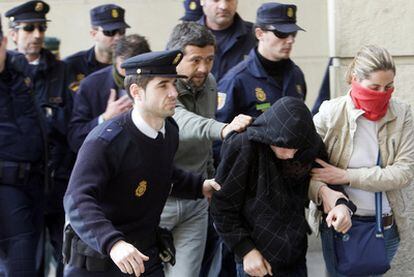Concealment conviction in murder case divides legal experts
Homicide and rape inquiry could take another surprise turn following verdict
What is Cuco hiding? Can someone be convicted for complicity in a crime that no one knows was committed because no one has yet gone to trial?
Javier G., known as El Cuco, has been acquitted of the January 2009 rape and killing of 17-year-old Marta del Castillo. Yet he was convicted of helping conceal the crime allegedly perpetrated by his friend Miguel Carcaño, who has not yet been put on trial.
The ruling has sparked a legal debate that has experts divided. The majority side with the ruling handed down by Juvenile Court Judge Alejandro Vián, who had the difficult task of reconstructing ? without much evidence or testimony ? the series of events in which four co-defendants have been charged as adults. But the experts all agree there is a lot of evidence lacking from this complex investigation. The several alleged accomplices who have been charged, including the minor, have been changing their stories while at the same time seemingly protecting one another.
"He cannot be convicted of somethig which hasn't been proven"
"Concealment is a stand-alone crime against the justice system"
If Marta's body had been found, police could accurately reconstruct what happened and the evidence would serve to support the case for or against all of the defendants.
Borja Mapelli, a criminal law professor at the University of Seville, praises Judge Vián for "his bravery" in acquitting Cuco of the more serious charges he was facing. "The judge basically had to do a juggling act and he did it well," he said.
But Mapelli also believes there is "a big contradiction" in Vián's ruling. "It appears the judge has made a big effort, but you cannot convict someone of concealment for something that is being alleged."
Former prosecutor José María Calero, a family lawyer who represents Marta's parents, also believes that for a cover-up conviction there has to be a crime committed. In this case, "no court has handed down a conviction before [Cuco's own] sentencing."
"He cannot be convicted for it by a judge who repeatedly refers to the main crime as acts committed by individuals 'who have yet to be put on trial.' If they are not put on trial, why then do they say countless times that Miguel killed Marta?"
Inmaculada Ramos, law professor at the University of Granada, doesn't agree. Ramos said that under the Penal Code, concealment "doesn't necessarily mean any participation in a crime" such as that which accomplices are usually charged with.
"Concealment is a stand- alone crime which means it was committed against the administering of justice and, for that reason, anyone can be put on trial for concealment."
Nevertheless, Ramos adds that it isn't often that individuals are tried and convicted in separate trials from the perpetrators. "But in this case, it had to be that way because he is a minor," she said.
The concealment charge was not contained in the original indictment against Cuco but filed against him on the last day of his trial. The entire case was built on charges of sexual assault and murder, but during closing arguments the prosecutor said that as a possible alternative the judge could find Cuco guilty of concealment if the court couldn't reach a decision based on the evidence to convict the minor on the original charges.
If the prosecutor hadn't suggested the charge, Cuco may have been acquitted.
Félix Pantoja, a former juvenile prosecutor and spokesman for the General Council of the Judiciary (CGPJ), says that while the minor was convicted for covering up a crime that hasn't yet been proven at trial, in this case there are "sufficient" elements to charge him with concealment.
"The judge has handed down a ruling on the facts but that ruling is only valid in juvenile court," says Pantoja, who adds that two separate trials were needed in this case.
Even Judge Vián rejected arguments presented by Marta's parents over the unconstitutionality of the Minors Law, which allows for separate trials in certain cases.
María Isabel Romero, law professor at the University of Seville, said she is surprised that all attention in the Marta case is now being focused on the Cuco conviction.
"It seems that public opinion links that result with the two court cases," which "legally cannot be done."
"The fact that there were allegations in the case against the minor that were considered to allege the participation of others, who have not been put on trial, doesn't have any effect on the other case that the adults are facing," she said.
Among those who support holding one trial for all defendants to avoid situations like this is Joan Queralt, law professor at the University of Barcelona. Holding two trials is "utter nonsense," he said.
"In the eagerness to protect the minor maybe they are creating a situation where adults have little defense," he warns.
Queralt recalls that there was a great debate when the Minors Law was being drafted over the provision of whether to hold separate trials between juveniles and adults for the same crime. He said that he always defended the one-trial rule but the majority of the law's architects opted for the other alternative.
There is another legal anomaly that has crept up in the Marta case. With Cuco's conviction, it was already established that he did not participate in the rape and murder of the victim. How is this going to help prosecutors construct their case to charge Miguel Carcaño with the crime? According to the preliminary investigation, one suspect held Marta while the others raped her. Together they moved her to an undisclosed location where they killed her.
"There is already one court that says Cuco didn't commit these crimes, which now cannot be alleged in another courtroom," said Ramos.











































